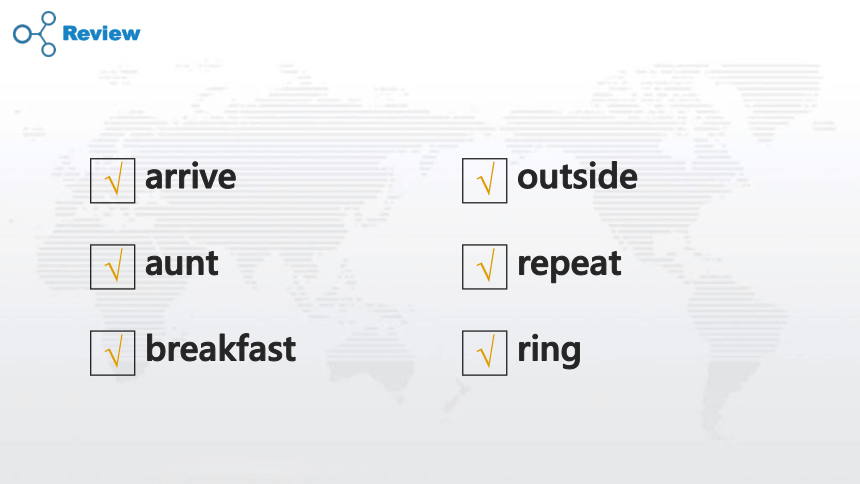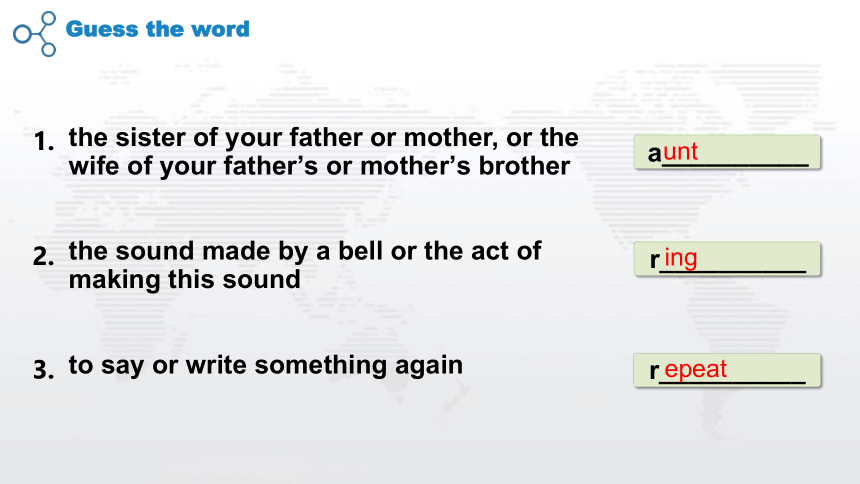新概念英语第二册 Lesson2课件
文档属性
| 名称 | 新概念英语第二册 Lesson2课件 |  | |
| 格式 | pptx | ||
| 文件大小 | 9.9MB | ||
| 资源类型 | 试卷 | ||
| 版本资源 | 新概念英语 | ||
| 科目 | 英语 | ||
| 更新时间 | 2023-03-02 17:31:03 | ||
图片预览












文档简介
(共71张PPT)
Breakfast or lunch
Lesson 2
NCE 2
Words
目录
CONTENTS
Reading
Grammar
Summary
01 words
words
outside
words
side
outside
inside
words
ring
words
aunt
words
breakfast
words
repeat
words
arrive
Review
√
aunt
√
breakfast
√
arrive
√
repeat
√
ring
√
outside
Guess the word
the sister of your father or mother, or the wife of your father’s or mother’s brother
the sound made by a bell or the act of making this sound
to say or write something again
a__________
r__________
1.
2.
unt
ing
r__________
3.
epeat
Guess the word
to get to the place you are going to
the meal you have in the morning
not inside a building
a__________
b__________
o__________
4.
5.
6.
rrive
reakfast
utside
Guess the word
arrive aunt breakfast never
outside repeat ring until
I ______ get up early on Sundays.
I didn't go to bed ______ ten o'clock.
He played ______ with his friends.
Just then the telephone ______.
1.
2.
3.
4.
never
until
outside
rang
Guess the word
The woman in red is my ______.
I'm having _________.
You can learn these words by __________ after me.
I ______ in Beijing yesterday.
5.
6.
7.
8.
arrive aunt breakfast never
outside repeat ring until
aunt
breakfast
repeating
arrived
02 Reading
Watch a video
Breakfast or lunch
Q1 : What day was it
Q2 : What was it like outside
Q3 : Who was on the phone
Look, think and answer
It was Sunday.
What day was it
Look, think and answer
It was dark outside.
What was it like outside
Look, think and answer
It was aunt Lucy.
Who was on the phone
Tell whether the following statements are true or false (T/F)
( )1. The writer rarely gets up early on Sundays.
( )2. Last Sunday he got up very early.
( )3. It was raining outside.
( )4. The telephone rang when he was looking out of the window.
( )5. His aunt Lucy was coming to take the train.
( )6. He was still having lunch.
T
F
T
T
F
F
Breakfast or lunch
It was Sunday. I never get up early on Sundays. I sometimes stay in bed until lunchtime. Last Sunday I got up very late. I looked out of the window. It was dark outside. 'What a day!' I thought. 'It's raining again.' Just then, the telephone rang. It was my aunt Lucy. 'I've just arrived by train,' she said. 'I'm coming to see you.'
'But I'm still having breakfast,' I said.
'What are you doing ' she asked.
'I'm having breakfast,' I repeated.
'Dear me,' she said. 'Do you always get up so late
It's one o'clock!'
Fill in the blanks with proper words
It was Sunday. I never _____ (get) up early_____ Sundays. I sometimes stay _____ bed _____ lunchtime. Last Sunday I _____ (get) up very late. I__________ (look) out _____ the window. It _____ dark outside. “What _____ day!” I_________ (think). “It’s raining again.” Just then, _____ telephone _____ (ring). It _____ my aunt Lucy. “I’ve just _________ (arrive) by train,” she said. “I’m coming_____ see you.”
“But I’m still having breakfast,” I_____ (say).
“What are you doing ” she ________ (ask).
“I’m having breakfast,” I ____________ (repeat).
“Dear me!” she _____ (say). “_____ you always get up so late It’s one o’clock!”
get
on
until
got
looked
of
was
a
thought
the
rang
was
arrrived
to
said
asked
repeated
said
Do
in
Multiple choice
1. When Aunt Lucy telephoned, ____.
(a) The writer was asleep (b) the writer was still in bed
(c) the writer had already got up (d) the writer was having lunch
2. Aunt Lucy was surprised because____.
(a) the writer was having lunch (b) it was one o’clock
(c) it was late (d) the writer was having breakfast at lunchtime
3. He sometimes ____ in bed until lunchtime.
(a) stay (b) is staying (c) stays (d) staying
4. He stayed in bed until lunchtime. He went ____ bed late last night.
(a) in (b) into (c) to (d) at
c
d
c
c
Multiple choice
5. He doesn’t get up early on Sundays. He gets up ____.
(a) late (b) lately (c) slowly (d) hardly
6. ____ did Aunt Lucy come By train.
(a) When (b) How (c) Why (d) Where
7. The writer can’t see Aunt Lucy_____. He’s having breakfast.
(a) still (b) now (c) often (d) always
8. He ____ out of the window and saw that it was raining.
(a) looked (b) saw (c) remarked (d) watched
9. Just then, the telephone rang. It rang ____.
(a) at once (b) immediately (c) again (d) at that moment
a
b
b
a
d
Multiple choice
10. She was his aunt, so he was her ____.
(a) son (b) grandson (c) nephew (d) niece
11. Breakfast is the first ____ of the day.
(a) food (b) dinner (c) lunch (d) meal
12. Aunt Lucy said, “Dear me,” because she was ____.
(a) angry (b) surprised (c) tired (d) pleased
c
d
b
Words and phrases
It was Sunday. I never get up early on Sundays. I sometimes stay in bed until lunchtime. Last Sunday I got up very late. I looked out of the window. It was dark outside. 'What a day!' I thought. 'It's raining again.' Just then, the telephone rang. It was my aunt Lucy. 'I've just arrived by train,' she said. 'I'm coming to see you.'
'But I'm still having breakfast,' I said.
'What are you doing ' she asked.
'I'm having breakfast,' I repeated.
'Dear me,' she said. 'Do you always get up so late
It's one o'clock!'
思考:
1.现在是七点半
2.门铃x响了,是我阿姨。
3.今天太热了。
4.外面一片漆黑。
Words and phrases
It was Sunday. I never get up early on Sundays. I sometimes stay in bed until lunchtime. Last Sunday I got up very late. I looked out of the window. It was dark outside. 'What a day!' I thought. 'It's raining again.' Just then, the telephone rang. It was my aunt Lucy. 'I've just arrived by train,' she said. 'I'm coming to see you.'
'But I'm still having breakfast,' I said.
'What are you doing ' she asked.
'I'm having breakfast,' I repeated.
'Dear me,' she said. 'Do you always get up so late
It's one o'clock!'
思考:
此处为什么用一般现在时?
on Sundays=
Words and phrases
It was Sunday. I never get up early on Sundays. I sometimes stay in bed until lunchtime. Last Sunday I got up very late. I looked out of the window. It was dark outside. 'What a day!' I thought. 'It's raining again.' Just then, the telephone rang. It was my aunt Lucy. 'I've just arrived by train,' she said. 'I'm coming to see you.'
'But I'm still having breakfast,' I said.
'What are you doing ' she asked.
'I'm having breakfast,' I repeated.
'Dear me,' she said. 'Do you always get up so late
It's one o'clock!'
思考:
look out of 和look out的区别
Words and phrases
It was Sunday. I never get up early on Sundays. I sometimes stay in bed until lunchtime. Last Sunday I got up very late. I looked out of the window. It was dark outside. 'What a day!' I thought. 'It's raining again.' Just then, the telephone rang. It was my aunt Lucy. 'I've just arrived by train,' she said. 'I'm coming to see you.'
'But I'm still having breakfast,' I said.
'What are you doing ' she asked.
'I'm having breakfast,' I repeated.
'Dear me,' she said. 'Do you always get up so late
It's one o'clock!'
思考:
dark和black的区别
Words and phrases
It was Sunday. I never get up early on Sundays. I sometimes stay in bed until lunchtime. Last Sunday I got up very late. I looked out of the window. It was dark outside. 'What a day!' I thought. 'It's raining again.' Just then, the telephone rang. It was my aunt Lucy. 'I've just arrived by train,' she said. 'I'm coming to see you.'
'But I'm still having breakfast,' I said.
'What are you doing ' she asked.
'I'm having breakfast,' I repeated.
'Dear me,' she said. 'Do you always get up so late
It's one o'clock!'
思考:
What和how引导的感叹句的区别
Words and phrases
It was Sunday. I never get up early on Sundays. I sometimes stay in bed until lunchtime. Last Sunday I got up very late. I looked out of the window. It was dark outside. 'What a day!' I thought. 'It's raining again.' Just then, the telephone rang. It was my aunt Lucy. 'I've just arrived by train,' she said. 'I'm coming to see you.'
'But I'm still having breakfast,' I said.
'What are you doing ' she asked.
'I'm having breakfast,' I repeated.
'Dear me,' she said. 'Do you always get up so late
It's one o'clock!'
思考:
then原义是?just then 又是什么意思?
Words and phrases
It was Sunday. I never get up early on Sundays. I sometimes stay in bed until lunchtime. Last Sunday I got up very late. I looked out of the window. It was dark outside. 'What a day!' I thought. 'It's raining again.' Just then, the telephone rang. It was my aunt Lucy. 'I've just arrived by train,' she said. 'I'm coming to see you.'
'But I'm still having breakfast,' I said.
'What are you doing ' she asked.
'I'm having breakfast,' I repeated.
'Dear me,' she said. 'Do you always get up so late
It's one o'clock!'
思考:
arrive的用法?
还有哪些其他的交通方式?
Words and phrases
It was Sunday. I never get up early on Sundays. I sometimes stay in bed until lunchtime. Last Sunday I got up very late. I looked out of the window. It was dark outside. 'What a day!' I thought. 'It's raining again.' Just then, the telephone rang. It was my aunt Lucy. 'I've just arrived by train,' she said. 'I'm coming to see you.'
'But I'm still having breakfast,' I said.
'What are you doing ' she asked.
'I'm having breakfast,' I repeated.
'Dear me,' she said. 'Do you always get up so late
It's one o'clock!'
思考:
to的哪一种用法
Words and phrases
It was Sunday. I never get up early on Sundays. I sometimes stay in bed until lunchtime. Last Sunday I got up very late. I looked out of the window. It was dark outside. 'What a day!' I thought. 'It's raining again.' Just then, the telephone rang. It was my aunt Lucy. 'I've just arrived by train,' she said. 'I'm coming to see you.'
'But I'm still having breakfast,' I said.
'What are you doing ' she asked.
'I'm having breakfast,' I repeated.
'Dear me,' she said. 'Do you always get up so late
It's one o'clock!'
思考:
此处表示主人公什么样的感情?
Look and find
It was Sunday. I never get up early on Sundays. I sometimes stay in bed until lunchtime. Last Sunday I got up very late. I looked out of the window. It was dark outside. 'What a day!' I thought. 'It's raining again.' Just then, the telephone rang. It was my aunt Lucy. 'I've just arrived by train,' she said. 'I'm coming to see you.'
'But I'm still having breakfast,' I said.
'What are you doing ' she asked.
'I'm having breakfast,' I repeated.
'Dear me,' she said. 'Do you always get up so late
It's one o'clock!'
文中的反义词组,你看出来了吗?
Do you know the past form of these verbs
is ___________ say ___________
ring ___________ think ___________
get ___________
was
said
rang
thought
got
Reading
03 Grammar
Grammar
如何描述正在发生的动作?
Grammar
He ________ still ________.
is
sleeping
Grammar
It ________ ________.
is raining
Grammar
I ________ ________in bed.
am reading
Grammar
We ________ ________our lunch.
are enjoying
Discover the structure
1. He is still sleeping in the morning.
2. It is raining outside.
3. We are enjoying our lunch at home.
4. I am reading in bed.
现在进行时
表示此时此刻___________的动作
谓语部分为__________________ 的形式
正在发生
am/is/are doing
Draw the conclusion
1. It's nine o'clock.The students ____________ a maths class.
A. have B. had C. is having D. are having
2. Look! They ____________ a good time, ____________ they
A. have; do B. have; don't C. are having; are D. are having; aren't
D
D
Grammar
如何描述经常发生的动作
Grammar
He rarely________ ________early before 7 o'clock.
gets up
Grammar
We frequently ________ ________at this restaurant.
have lunch
Grammar
The shop always ________ on Saturday afternoons.
opens
Grammar
Our teacher usually __________ our exercise books.
collects
Grammar
I sometimes__________ __________ __________.
listen to music
Grammar
She __________ often__________ __________school.
is late for
1. We frequently have dinner at this restaurant.
2. The shop always opens on Saturday afternoon.
3. Our teacher usually collects our exercise book.
4. I sometimes listen to music.
5.He rarely gets up early before 7 o'clock.
一般现在时
表示___________的动作
谓语部分为___________ 的形式
经常性习惯性
do/does
Draw the conclusion
Choose the right answer
1. John is from England. He ____________ English.
A. spoke B. will speak C. speaks D. had spoken
2. Our teacher told us the sun _______in the east and ______ in the west
A. rose;set B. rises;sets C. rises; set D. rise; sets
C
B
Adverb of frequency
1. We frequently have dinner at this restaurant.
2. The shop always opens on Saturday afternoon.
3. Our teacher usually collects our exercise book.
4. I sometimes listen to music.
5.He rarely gets up early before 7 o'clock.
频率副词
除以上频率副词外,还能想到哪些?
Adverb of frequency
1. We frequently have dinner at this restaurant.
2. The shop always opens on Saturday afternoon.
3. Our teacher usually collects our exercise book.
4. I sometimes listen to music.
5.He rarely gets up early before 7 o'clock.
频率副词
频率副词和动词的位置关系是什么?
Adverb of frequency
He is always late for school.
频率副词
频率副词和be动词的位置关系是什么?
Adverb of frequency
Transform the sentences
1. I get up early on Sundays. (never)
_______________________________________
2. Do you have breakfast in bed (ever)
_______________________________________
________________________________________
3. Jim is doing his homework. (still)
_________________________________________
4. We go for a walk in the forest. (frequently)
I never get up early on Sundays.
Do you ever have breakfast in bed
Jim is still doing his homework.
We frequently go for a walk in the forest .
Multiple choice
( )1. The bus was ten minutes_______.
A. late B. later C. latest D. lately
( )2. The little boy came riding full speed down the motorway on his bicycle.
_______ dangerous the scence was!
A. What a B. How a C. What D. How
( )3.—Kate, when you arrived there, remember to________ me.
—Ok. Mom.
A. ring B. ringing C. rang D. rung
A
D
A
Multiple choice
( ) 4.I hope that I can go to study abroad_______in the future.
A. sometime B. some time C. sometimes D. some times
( ) 5. The students will go to the West Hill Farm on foot if it_______fine tomorrow.
A. will be B. is C. shall be D. was
( ) 6. —Have you got any job offers
—No. I_______.
A. waited B. had been waiting C. have waited D. am waiting
A
B
D
Multiple choice
( ) 7. He has________ things to do that he can’t go out to play.
A. such little B. so few C. such much D. so many
( ) 8. She is very lazy and_______ gets up early at weekends.
A. always B. usually C. never D. also
( ) 9.—Do you know if Terry will go camping this weekend
—Terry Never! She_______ tents.
A. has hated B. hated C. will hate D. hates
D
C
D
Multiple choice
( )10. _______great day July 1, 2013 will be!
A. How a B. What a C. How D. What
( )11.I didn’t finish my homework______my mother came back home.
A. since B. after C. until D. because
( )12. Months ago, we sailed ten thousand miles across this open sea, which______ the Pacific, and we met no storms.
A. was called B. had been called C. is called D. has been called
B
C
C
Multiple choice
( )13. Teenagers______ their health because they play computer games too much.
A. have damaged B. are damaging C. damaged D. will damage
( )14. Just then, the telephone rang. It rang ______.
A. at once B. saw
C. again D. at that moment
( )15.Listen to the two girls by the window. What language ________
A. did they speak B.were they speaking
C. are they speaking D.have they been speaking
B
D
C
Transform the sentences
1.That’s a lovely surprise.(用 how 改成感叹句)
_______________________________________________
2. How quickly time passed!(改成陈述句)
_______________________________________________
3.It’s an awful mess.(用what改成感叹句)
—————————————————————————
4. What a good time we are having! (改成陈述句)
_________________________________________________
5. It’s expensive furniture. (用 what 改成感叹句)
_________________________________________________
How lovely a surprise!
Time passed quickly.
What an awful mess it is!
We are having a good time.
What expensive furniture it is!
04 Summary
Review
√
a_____
√
b_____
√
a_____
√
r_____
√
r_____
√
o_____
Reading
Grammar
现在进行时 VS 一般现在时
Homework
NCE 2
Breakfast or lunch
Lesson 2
NCE 2
Words
目录
CONTENTS
Reading
Grammar
Summary
01 words
words
outside
words
side
outside
inside
words
ring
words
aunt
words
breakfast
words
repeat
words
arrive
Review
√
aunt
√
breakfast
√
arrive
√
repeat
√
ring
√
outside
Guess the word
the sister of your father or mother, or the wife of your father’s or mother’s brother
the sound made by a bell or the act of making this sound
to say or write something again
a__________
r__________
1.
2.
unt
ing
r__________
3.
epeat
Guess the word
to get to the place you are going to
the meal you have in the morning
not inside a building
a__________
b__________
o__________
4.
5.
6.
rrive
reakfast
utside
Guess the word
arrive aunt breakfast never
outside repeat ring until
I ______ get up early on Sundays.
I didn't go to bed ______ ten o'clock.
He played ______ with his friends.
Just then the telephone ______.
1.
2.
3.
4.
never
until
outside
rang
Guess the word
The woman in red is my ______.
I'm having _________.
You can learn these words by __________ after me.
I ______ in Beijing yesterday.
5.
6.
7.
8.
arrive aunt breakfast never
outside repeat ring until
aunt
breakfast
repeating
arrived
02 Reading
Watch a video
Breakfast or lunch
Q1 : What day was it
Q2 : What was it like outside
Q3 : Who was on the phone
Look, think and answer
It was Sunday.
What day was it
Look, think and answer
It was dark outside.
What was it like outside
Look, think and answer
It was aunt Lucy.
Who was on the phone
Tell whether the following statements are true or false (T/F)
( )1. The writer rarely gets up early on Sundays.
( )2. Last Sunday he got up very early.
( )3. It was raining outside.
( )4. The telephone rang when he was looking out of the window.
( )5. His aunt Lucy was coming to take the train.
( )6. He was still having lunch.
T
F
T
T
F
F
Breakfast or lunch
It was Sunday. I never get up early on Sundays. I sometimes stay in bed until lunchtime. Last Sunday I got up very late. I looked out of the window. It was dark outside. 'What a day!' I thought. 'It's raining again.' Just then, the telephone rang. It was my aunt Lucy. 'I've just arrived by train,' she said. 'I'm coming to see you.'
'But I'm still having breakfast,' I said.
'What are you doing ' she asked.
'I'm having breakfast,' I repeated.
'Dear me,' she said. 'Do you always get up so late
It's one o'clock!'
Fill in the blanks with proper words
It was Sunday. I never _____ (get) up early_____ Sundays. I sometimes stay _____ bed _____ lunchtime. Last Sunday I _____ (get) up very late. I__________ (look) out _____ the window. It _____ dark outside. “What _____ day!” I_________ (think). “It’s raining again.” Just then, _____ telephone _____ (ring). It _____ my aunt Lucy. “I’ve just _________ (arrive) by train,” she said. “I’m coming_____ see you.”
“But I’m still having breakfast,” I_____ (say).
“What are you doing ” she ________ (ask).
“I’m having breakfast,” I ____________ (repeat).
“Dear me!” she _____ (say). “_____ you always get up so late It’s one o’clock!”
get
on
until
got
looked
of
was
a
thought
the
rang
was
arrrived
to
said
asked
repeated
said
Do
in
Multiple choice
1. When Aunt Lucy telephoned, ____.
(a) The writer was asleep (b) the writer was still in bed
(c) the writer had already got up (d) the writer was having lunch
2. Aunt Lucy was surprised because____.
(a) the writer was having lunch (b) it was one o’clock
(c) it was late (d) the writer was having breakfast at lunchtime
3. He sometimes ____ in bed until lunchtime.
(a) stay (b) is staying (c) stays (d) staying
4. He stayed in bed until lunchtime. He went ____ bed late last night.
(a) in (b) into (c) to (d) at
c
d
c
c
Multiple choice
5. He doesn’t get up early on Sundays. He gets up ____.
(a) late (b) lately (c) slowly (d) hardly
6. ____ did Aunt Lucy come By train.
(a) When (b) How (c) Why (d) Where
7. The writer can’t see Aunt Lucy_____. He’s having breakfast.
(a) still (b) now (c) often (d) always
8. He ____ out of the window and saw that it was raining.
(a) looked (b) saw (c) remarked (d) watched
9. Just then, the telephone rang. It rang ____.
(a) at once (b) immediately (c) again (d) at that moment
a
b
b
a
d
Multiple choice
10. She was his aunt, so he was her ____.
(a) son (b) grandson (c) nephew (d) niece
11. Breakfast is the first ____ of the day.
(a) food (b) dinner (c) lunch (d) meal
12. Aunt Lucy said, “Dear me,” because she was ____.
(a) angry (b) surprised (c) tired (d) pleased
c
d
b
Words and phrases
It was Sunday. I never get up early on Sundays. I sometimes stay in bed until lunchtime. Last Sunday I got up very late. I looked out of the window. It was dark outside. 'What a day!' I thought. 'It's raining again.' Just then, the telephone rang. It was my aunt Lucy. 'I've just arrived by train,' she said. 'I'm coming to see you.'
'But I'm still having breakfast,' I said.
'What are you doing ' she asked.
'I'm having breakfast,' I repeated.
'Dear me,' she said. 'Do you always get up so late
It's one o'clock!'
思考:
1.现在是七点半
2.门铃x响了,是我阿姨。
3.今天太热了。
4.外面一片漆黑。
Words and phrases
It was Sunday. I never get up early on Sundays. I sometimes stay in bed until lunchtime. Last Sunday I got up very late. I looked out of the window. It was dark outside. 'What a day!' I thought. 'It's raining again.' Just then, the telephone rang. It was my aunt Lucy. 'I've just arrived by train,' she said. 'I'm coming to see you.'
'But I'm still having breakfast,' I said.
'What are you doing ' she asked.
'I'm having breakfast,' I repeated.
'Dear me,' she said. 'Do you always get up so late
It's one o'clock!'
思考:
此处为什么用一般现在时?
on Sundays=
Words and phrases
It was Sunday. I never get up early on Sundays. I sometimes stay in bed until lunchtime. Last Sunday I got up very late. I looked out of the window. It was dark outside. 'What a day!' I thought. 'It's raining again.' Just then, the telephone rang. It was my aunt Lucy. 'I've just arrived by train,' she said. 'I'm coming to see you.'
'But I'm still having breakfast,' I said.
'What are you doing ' she asked.
'I'm having breakfast,' I repeated.
'Dear me,' she said. 'Do you always get up so late
It's one o'clock!'
思考:
look out of 和look out的区别
Words and phrases
It was Sunday. I never get up early on Sundays. I sometimes stay in bed until lunchtime. Last Sunday I got up very late. I looked out of the window. It was dark outside. 'What a day!' I thought. 'It's raining again.' Just then, the telephone rang. It was my aunt Lucy. 'I've just arrived by train,' she said. 'I'm coming to see you.'
'But I'm still having breakfast,' I said.
'What are you doing ' she asked.
'I'm having breakfast,' I repeated.
'Dear me,' she said. 'Do you always get up so late
It's one o'clock!'
思考:
dark和black的区别
Words and phrases
It was Sunday. I never get up early on Sundays. I sometimes stay in bed until lunchtime. Last Sunday I got up very late. I looked out of the window. It was dark outside. 'What a day!' I thought. 'It's raining again.' Just then, the telephone rang. It was my aunt Lucy. 'I've just arrived by train,' she said. 'I'm coming to see you.'
'But I'm still having breakfast,' I said.
'What are you doing ' she asked.
'I'm having breakfast,' I repeated.
'Dear me,' she said. 'Do you always get up so late
It's one o'clock!'
思考:
What和how引导的感叹句的区别
Words and phrases
It was Sunday. I never get up early on Sundays. I sometimes stay in bed until lunchtime. Last Sunday I got up very late. I looked out of the window. It was dark outside. 'What a day!' I thought. 'It's raining again.' Just then, the telephone rang. It was my aunt Lucy. 'I've just arrived by train,' she said. 'I'm coming to see you.'
'But I'm still having breakfast,' I said.
'What are you doing ' she asked.
'I'm having breakfast,' I repeated.
'Dear me,' she said. 'Do you always get up so late
It's one o'clock!'
思考:
then原义是?just then 又是什么意思?
Words and phrases
It was Sunday. I never get up early on Sundays. I sometimes stay in bed until lunchtime. Last Sunday I got up very late. I looked out of the window. It was dark outside. 'What a day!' I thought. 'It's raining again.' Just then, the telephone rang. It was my aunt Lucy. 'I've just arrived by train,' she said. 'I'm coming to see you.'
'But I'm still having breakfast,' I said.
'What are you doing ' she asked.
'I'm having breakfast,' I repeated.
'Dear me,' she said. 'Do you always get up so late
It's one o'clock!'
思考:
arrive的用法?
还有哪些其他的交通方式?
Words and phrases
It was Sunday. I never get up early on Sundays. I sometimes stay in bed until lunchtime. Last Sunday I got up very late. I looked out of the window. It was dark outside. 'What a day!' I thought. 'It's raining again.' Just then, the telephone rang. It was my aunt Lucy. 'I've just arrived by train,' she said. 'I'm coming to see you.'
'But I'm still having breakfast,' I said.
'What are you doing ' she asked.
'I'm having breakfast,' I repeated.
'Dear me,' she said. 'Do you always get up so late
It's one o'clock!'
思考:
to的哪一种用法
Words and phrases
It was Sunday. I never get up early on Sundays. I sometimes stay in bed until lunchtime. Last Sunday I got up very late. I looked out of the window. It was dark outside. 'What a day!' I thought. 'It's raining again.' Just then, the telephone rang. It was my aunt Lucy. 'I've just arrived by train,' she said. 'I'm coming to see you.'
'But I'm still having breakfast,' I said.
'What are you doing ' she asked.
'I'm having breakfast,' I repeated.
'Dear me,' she said. 'Do you always get up so late
It's one o'clock!'
思考:
此处表示主人公什么样的感情?
Look and find
It was Sunday. I never get up early on Sundays. I sometimes stay in bed until lunchtime. Last Sunday I got up very late. I looked out of the window. It was dark outside. 'What a day!' I thought. 'It's raining again.' Just then, the telephone rang. It was my aunt Lucy. 'I've just arrived by train,' she said. 'I'm coming to see you.'
'But I'm still having breakfast,' I said.
'What are you doing ' she asked.
'I'm having breakfast,' I repeated.
'Dear me,' she said. 'Do you always get up so late
It's one o'clock!'
文中的反义词组,你看出来了吗?
Do you know the past form of these verbs
is ___________ say ___________
ring ___________ think ___________
get ___________
was
said
rang
thought
got
Reading
03 Grammar
Grammar
如何描述正在发生的动作?
Grammar
He ________ still ________.
is
sleeping
Grammar
It ________ ________.
is raining
Grammar
I ________ ________in bed.
am reading
Grammar
We ________ ________our lunch.
are enjoying
Discover the structure
1. He is still sleeping in the morning.
2. It is raining outside.
3. We are enjoying our lunch at home.
4. I am reading in bed.
现在进行时
表示此时此刻___________的动作
谓语部分为__________________ 的形式
正在发生
am/is/are doing
Draw the conclusion
1. It's nine o'clock.The students ____________ a maths class.
A. have B. had C. is having D. are having
2. Look! They ____________ a good time, ____________ they
A. have; do B. have; don't C. are having; are D. are having; aren't
D
D
Grammar
如何描述经常发生的动作
Grammar
He rarely________ ________early before 7 o'clock.
gets up
Grammar
We frequently ________ ________at this restaurant.
have lunch
Grammar
The shop always ________ on Saturday afternoons.
opens
Grammar
Our teacher usually __________ our exercise books.
collects
Grammar
I sometimes__________ __________ __________.
listen to music
Grammar
She __________ often__________ __________school.
is late for
1. We frequently have dinner at this restaurant.
2. The shop always opens on Saturday afternoon.
3. Our teacher usually collects our exercise book.
4. I sometimes listen to music.
5.He rarely gets up early before 7 o'clock.
一般现在时
表示___________的动作
谓语部分为___________ 的形式
经常性习惯性
do/does
Draw the conclusion
Choose the right answer
1. John is from England. He ____________ English.
A. spoke B. will speak C. speaks D. had spoken
2. Our teacher told us the sun _______in the east and ______ in the west
A. rose;set B. rises;sets C. rises; set D. rise; sets
C
B
Adverb of frequency
1. We frequently have dinner at this restaurant.
2. The shop always opens on Saturday afternoon.
3. Our teacher usually collects our exercise book.
4. I sometimes listen to music.
5.He rarely gets up early before 7 o'clock.
频率副词
除以上频率副词外,还能想到哪些?
Adverb of frequency
1. We frequently have dinner at this restaurant.
2. The shop always opens on Saturday afternoon.
3. Our teacher usually collects our exercise book.
4. I sometimes listen to music.
5.He rarely gets up early before 7 o'clock.
频率副词
频率副词和动词的位置关系是什么?
Adverb of frequency
He is always late for school.
频率副词
频率副词和be动词的位置关系是什么?
Adverb of frequency
Transform the sentences
1. I get up early on Sundays. (never)
_______________________________________
2. Do you have breakfast in bed (ever)
_______________________________________
________________________________________
3. Jim is doing his homework. (still)
_________________________________________
4. We go for a walk in the forest. (frequently)
I never get up early on Sundays.
Do you ever have breakfast in bed
Jim is still doing his homework.
We frequently go for a walk in the forest .
Multiple choice
( )1. The bus was ten minutes_______.
A. late B. later C. latest D. lately
( )2. The little boy came riding full speed down the motorway on his bicycle.
_______ dangerous the scence was!
A. What a B. How a C. What D. How
( )3.—Kate, when you arrived there, remember to________ me.
—Ok. Mom.
A. ring B. ringing C. rang D. rung
A
D
A
Multiple choice
( ) 4.I hope that I can go to study abroad_______in the future.
A. sometime B. some time C. sometimes D. some times
( ) 5. The students will go to the West Hill Farm on foot if it_______fine tomorrow.
A. will be B. is C. shall be D. was
( ) 6. —Have you got any job offers
—No. I_______.
A. waited B. had been waiting C. have waited D. am waiting
A
B
D
Multiple choice
( ) 7. He has________ things to do that he can’t go out to play.
A. such little B. so few C. such much D. so many
( ) 8. She is very lazy and_______ gets up early at weekends.
A. always B. usually C. never D. also
( ) 9.—Do you know if Terry will go camping this weekend
—Terry Never! She_______ tents.
A. has hated B. hated C. will hate D. hates
D
C
D
Multiple choice
( )10. _______great day July 1, 2013 will be!
A. How a B. What a C. How D. What
( )11.I didn’t finish my homework______my mother came back home.
A. since B. after C. until D. because
( )12. Months ago, we sailed ten thousand miles across this open sea, which______ the Pacific, and we met no storms.
A. was called B. had been called C. is called D. has been called
B
C
C
Multiple choice
( )13. Teenagers______ their health because they play computer games too much.
A. have damaged B. are damaging C. damaged D. will damage
( )14. Just then, the telephone rang. It rang ______.
A. at once B. saw
C. again D. at that moment
( )15.Listen to the two girls by the window. What language ________
A. did they speak B.were they speaking
C. are they speaking D.have they been speaking
B
D
C
Transform the sentences
1.That’s a lovely surprise.(用 how 改成感叹句)
_______________________________________________
2. How quickly time passed!(改成陈述句)
_______________________________________________
3.It’s an awful mess.(用what改成感叹句)
—————————————————————————
4. What a good time we are having! (改成陈述句)
_________________________________________________
5. It’s expensive furniture. (用 what 改成感叹句)
_________________________________________________
How lovely a surprise!
Time passed quickly.
What an awful mess it is!
We are having a good time.
What expensive furniture it is!
04 Summary
Review
√
a_____
√
b_____
√
a_____
√
r_____
√
r_____
√
o_____
Reading
Grammar
现在进行时 VS 一般现在时
Homework
NCE 2
同课章节目录
